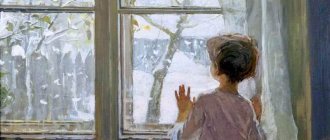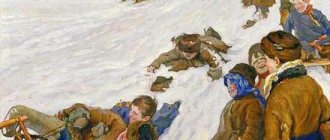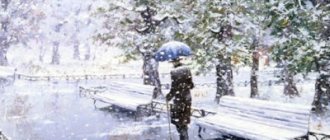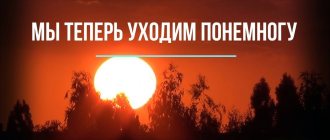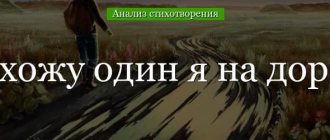Brief analysis of the poem “Winter” by I. Surikov
Option 1
Ivan Zakharovich’s poem “Winter,” written in 1880, reveals two interconnected themes - the solemn arrival of winter, which has come into its legal rights, and a description of rural life.
At the beginning of the work, the author vividly describes the snowfall. A picture emerges before the readers, like snow, swirling in flakes and falling like a veil. Surikov’s personification of winter is very colorful, despite the predominance of white color at this time of year.
Using metaphors, the poet notes the peace and tranquility of nature. The dark forest, so majestic, covered with a cap of snow, falls asleep soundly and soundly. Ivan Surikov had the ability to admire nature. Even seemingly simple lines at first glance carry a philosophical meaning. The author also thought it was charming that the sun was shining little, the days were short, and the frosts had arrived.
Despite the seemingly simple stanzas of the poem, upon careful analysis one can see that there are sentences with complicated homogeneous members with union and non-union connections “falls, lies down”, “strong, unstoppable”, “winters and colds”, “blizzards and blizzards” " But this does not in the least prevent students from secondary schools from studying this work by Ivan Zakharovich.
The poem “Winter” is the poetry of landscape lyricism. However, Surikov also describes rural life with restraint. Since the poet himself was born into the family of a serf peasant, he is familiar with the originality of the villagers. Thereby emphasizing the close connection between man and nature.
Restrained and simple, Ivan Surikov describes a peasant preparing a sleigh. Even in winter, villagers have plenty of worries, for example, preparing firewood. It is also necessary to insulate the hut with straw from the upcoming frosts. The poet is also touched by the fact that, despite the snowfall, frost and snow, the children build snow slides for skating.
The rhyme of the poem most clearly conveys the essence of this time of year and the direct participation of nature and man. The reader is presented with a picture in the form of a village with fields surrounded by forest. And all this splendor is covered with fluffy snow. Surikov managed to convey all the romance of a frosty morning in his work.
There are also artistic techniques in the poem. For example, the metaphor “here come the frosts”, “evil frost, angry”.
Surikov is considered one of the brightest poets who represented a movement, such as peasant poetry, that appeared in the 19th century.
This is interesting: A. Barto (1906–1981), Russian and Soviet children's writer, film screenwriter. In Barto's biography there is a place for bright meetings and exciting events, thanks to which her talent was revealed.
Option 2
Ivan Surikov was born and raised in a serf family, he lived hard and died in deep poverty. The lyrics of this wonderful poet, left to descendants, reveal the amazing talent and love of life of a man who suffered a lot in his life.
Ivan Surikov’s poem “Winter” is a vivid example of amazing poetic talent. It belongs to the genre of landscape lyricism and reflects the amazing ability of a person deprived by life to beautifully and warmly admire his native nature.
We see in these lines a real poet, bright and cheerful. His speech is smooth and melodic, filled with sincere kindness and admiration for the picture he sees. The author tenderly compares the snow cover with a warm robe that covered the field with a “veil” and a “wonderful” cap - a “dark forest” that fell asleep calmed down.
Everything is filled with deep human meaning, winter has fully taken its place, and we need to come to terms with it. That is why the main idea is stated briefly: “the frosts have arrived - and winter has come.” This has been the case from time immemorial, this is the essence of life and change.
The poet lovingly describes all the efforts of the peasant preparing for winter. A person close to nature knows and understands it, he accepts a new day with joy, because he knows how to appreciate every glimpse of happiness. And happiness is harmony with nature.
The subtle poetic nature of a peasant man perceives the world around him especially sensitively, this is felt in every line. The village man is unhurried, wise and hardworking. Understanding the harsh nature of winter, he does not complain about it, but prepares to live with it in peace and love.
Only by endlessly adoring this village life and feeling close to the natural world, the poet was able to find calm, succinct phrases describing the coming of winter. At the same time, Surikov’s speech is romantic and sublime.
The last stanza of the poem evokes fairy-tale motifs, here there is “evil frost, angry” as in folk tales, and “blizzards and blizzards” as living characters. Everything is ready for winter, it is cold, but also beautiful, and with it comes peasant rest.
Poems about winter for children
I can’t walk or drive, Because it’s icy. But it falls great! Why is no one happy?!
∞∞∞∞∞∞∞∞∞∞∞∞∞∞∞∞∞∞
The snow came with a blizzard - they can’t sit still! They're circling, circling like a carousel - Inviting you to have fun!
∞∞∞∞∞∞∞∞∞∞∞∞∞∞∞∞∞∞
Like white fluffs, snowflakes are falling from the sky. This is winter-winter, Decorating the forest and houses!
∞∞∞∞∞∞∞∞∞∞∞∞∞∞∞∞∞∞
Everyone is cold in winter, they run indoors faster. The sun remains. Who will warm him?
It used to be warm, We were glad of the sun. And now they admire the Snowfall Dance.
I’ll draw a sun in my album, And it’s as if the house will become brighter.
I’ll write a note, - I already know how: Don’t be sad, honey! I'll warm you.
∞∞∞∞∞∞∞∞∞∞∞∞∞∞∞∞∞∞
Three people on a snowy clearing: Me, Winter and a sled. Only the snow will cover the ground - The three of us gather. Having fun in the clearing - Me, Winter and sleigh.
∞∞∞∞∞∞∞∞∞∞∞∞∞∞∞∞∞∞
Frost is a magician! You can see this right away: I haven’t opened my album yet, but he has already painted all the windows for us overnight without brushes, without paints!
∞∞∞∞∞∞∞∞∞∞∞∞∞∞∞∞∞∞
The city is covered with snow, Frost hangs like lace... Boris clears the snow from the porch to the fence. And with a shovel in her hands, Marinka is next to him. The heat glows on the cheeks - The path is getting longer and longer. And the ears are not cold, Just as the frost is not angry, If only the kids want to work.
∞∞∞∞∞∞∞∞∞∞∞∞∞∞∞∞∞∞
Decorated the houses with a snowy winter. I happily hung tinsel on the trees. I rubbed the ice until it sparkled - Soon the holiday will come to us!
∞∞∞∞∞∞∞∞∞∞∞∞∞∞∞∞∞∞
Run out quickly to look at the bullfinches. They arrived, they arrived, the flock was greeted by snowstorms! And Frost the Red Nose brought them rowan trees. Well treated, well sweetened. Late winter evening Bright scarlet clusters.
∞∞∞∞∞∞∞∞∞∞∞∞∞∞∞∞∞∞
Well, winter!.. Snowdrifts, cold, Sweeps, twists, winds, Burns with frost, chokes with ice, Drives into a hot house. A flashy Christmas tree will flutter into the house almost like a dragonfly. It will fluff up, laugh, and shed snowy moisture.
Poem “Winter” – analysis according to plan
Option 1
Ivan Zakharovich Surikov is a poet who wrote during peasant poetry. In his poems he praised village life. Ivan Surikov was born into a poor peasant family. His works stand out for their simplicity and consonance. Surikov wrote the poem “Winter” in 1880, shortly before his death. The poet died in poverty, but he never complained about his life, because he believed that he had an extraordinary opportunity to become a good poet.
The theme of the poem is the onset of winter. It comes after the first frost. A work written in landscape lyricism, it contains ideological reflections on the meaning of life, since everything depends on nature. All transformations taking place in nature must be accepted jubilantly, reveling in every moment. The poet described the way of life of peasants.
On a frosty and sunny winter day, they still work hard. They need to go to the winter forest for firewood, without which they cannot live in the cold winter. True, the villagers took care of their homes long before the onset of winter, covering their huts with straw in order to protect their homes during the winter cold. However, the kids have fun and relaxation in the snowy, cold winter season. The main idea of the work by I.Z. Surikov - praises of village life, which is so familiar to the peasant.
The work is distinguished by its original sound, uniqueness of images and naturalness of style. The poem has eight stanzas. Each of them contains four lines. The work is depicted in iambic trimeter and has a rhyme (stress on the penultimate syllable). Surikov’s work “Winter” is imbued with picturesque images. For example, he uses the metaphor of frost that is angry and angry, a forest that has fallen asleep, frost has come. In the second stanza, the sonorant “l” and “n” are repeated, that is, the poet uses personification.
This poem touched my soul. It was as if I felt with the author the splendor and uniqueness of the winter picture of rural life. I admired the snowfall, the endless white snow-covered fields, and the enchanting forest. Together with the village residents, we lived an extraordinary, cold winter day, when the peasant took care of the comfort in the huts, and the children had fun, making snow balls while playing with the snow.
Option 2
History of creation
Ivan Zakharovich faced many trials in life. He was born and raised in an ordinary serf family, and his entire life, including his mature years, was spent in deep poverty. But this did not stop him from finding joy in simple everyday things. The poet never complained about his fate and was immensely happy that he had a direct connection with the poetry that he idolized.
Surikov became one of the brightest poets, representatives of such a movement as peasant poetry. In his works, he glorified simple and uncomplicated rural life, with its difficulties and rare grains of joy.
Lyrical poem “Winter” by Surikov in 1880, shortly before the poet’s death. In the last year of his life, Ivan Zakharovich suffered from tuberculosis, but he never ceased to sincerely rejoice in the beauty of the world around him and its amazing harmony. This is confirmed by the posthumous work “Winter” - very light and bright in content, filled with admiration for the beauty of winter nature.
Subject
The central theme of the poem is winter, which is just coming into its own. The work gives the reader a feeling of peace and peace of mind, which is evoked by a leisurely snowfall covering the earth with a white fluffy canvas. He hides all the ugliness of the orphaned black earth, dresses up the bare branches of trees in rich outfits.
The arrival of winter is described quite simply and restrainedly, which indicates the inevitable and natural subordination of existence to the laws of nature. The author emphasizes that any changes in the world around us should be accepted with joy and gratitude. Every moment of life is filled with its own charm; you just need to learn to appreciate simple joys.
The onset of winter brings its own troubles to peasant life: you need to insulate the hut, protect it from the winter cold, and bring firewood from the forest. However, in winter, peasants have much less work, and for children this time of year is a real holiday, because they can ride on ice slides and play snowballs until dark.
Composition
The poem consists of eight stanzas, each of which, in turn, includes four lines.
It is quite difficult to single out the lyrical hero in the work, but after reading it becomes clear that this is a man who enjoys the winter landscape. He is close to village life, the life of peasants. From this we can conclude that the lyrical hero in the poem “Winter” is Surikov himself. In the narrative, he takes the position of a somewhat detached observer who does not show his emotions in any way.
The composition of the work is harmonious. The plot can be divided into two conventional parts: in the first part, the poet demonstrates the beauty of the winter landscape, and in the second, he pays attention to peasant life.
Genre
The genre of the work is landscape lyricism. It very harmoniously intertwines the description of nature in the winter season and peasant life.
“Winter” is written in iambic trimeter using cross rhyme. The rhyme is feminine because the stress is on the penultimate syllable.
Means of expression
To reveal the winter theme, a large role in the poem is played by such means of artistic expression as epithets (“fluffy”, “angry”, “angry”), metaphors (“snowy mountains”), personification (“the forest fell asleep”, “frost has come”), comparisons (“the field turned white, then a shroud covered it all”).
Option 3
In Russian literature of the 19th and 20th centuries, there is such a direction as peasant poetry, the prominent representatives of which are Sergei Yesenin and Nikolai Nekrasov. Among the authors who glorified rural life in their works is Ivan Surikov, whose name has been undeservedly forgotten these days. The creative heritage of this poet, who was born into the family of a serf peasant, is small, but many of his works are still heard by readers, as they are distinguished by the simplicity of their style, special melody and amazing brightness of images.
Among them, it is worth noting the poem “Winter,” written in 1880, shortly before the death of Surikov, who died in poverty, but until the very last moment he did not lose the ability to admire the world around him and found it perfect even
despite the fact that fate did not show much favor to this author. However, the poet never complained about life and was convinced that he had a happy lot - to be a poet.
The poem “Winter” belongs to the category of landscape lyrics, and its first lines are dedicated to snowfall, which covers the earth with a white and fluffy blanket, transforming the world, making it cleaner and brighter. These lines emanate calm and tranquility, as well as anticipation of the holiday, which is sure to come, if only because winter is coming into its own.
The poet describes her arrival very simply and laconically - “here the frosts came - and winter has come.” However, this simple phrase contains the philosophical wisdom of existence, the meaning of which boils down to the fact that we all obey the laws of nature. Therefore, any changes in the world around us should be perceived with joy and enjoy every moment of life, which is filled with amazing charm for those who know how to appreciate simple human joys.
Describing the life of the peasants, the poet notes that on a sunny and frosty winter day they still have enough worries. You need to harness the sleigh and go for firewood, without which it is impossible to survive the cold. At the same time, the villager prepares for winter very thoroughly and in advance; he has long covered the outside of the hut with straw to protect his home from the cold. But in the snowy winter it is a haven for children, and in almost every village “children build snow mountains.”
Simple rural life is described in this work with restraint and unpretentiousness. The main thing for peasants is to take care of their home, stock up on firewood and food, hay for livestock and warm clothes. This time of year is quite calm for rural residents, and they have time to pay attention to their meager farming and prepare for the upcoming sowing season, on which the well-being of the whole family depends.
However, winter, even for a villager, is not without romance. And Ivan Surikov, who spent most of his life in the village, never ceases to be amazed at the beauty of the “dark forest”, which overnight acquired a luxurious and lush cap of snow, white fields and short days, which are replaced by long winter evenings filled with special charm. Only a truly gifted person who knows how to appreciate beauty and selflessly loves his native nature, appreciates peasant life and has a very subtle poetic nature can write so simply and artlessly about complex things.
Therefore, it is not surprising that Ivan Surikov is considered one of the brightest and most original poets of the Russian village, who was able to breathe romance into the usual way of rural life and present it in such a way that every reader would want to slide down a high snowy mountain on the outskirts of the village or wander through a sleeping forest , listening to the creaking of snowdrifts and breathing in the frosty, tart air.
This is interesting: “The Malefactor” Chekhov read a humorous story in which the writer raised the global problems of Russia in the 19th century: negligence, irresponsibility, dishonest attitude towards state property.
